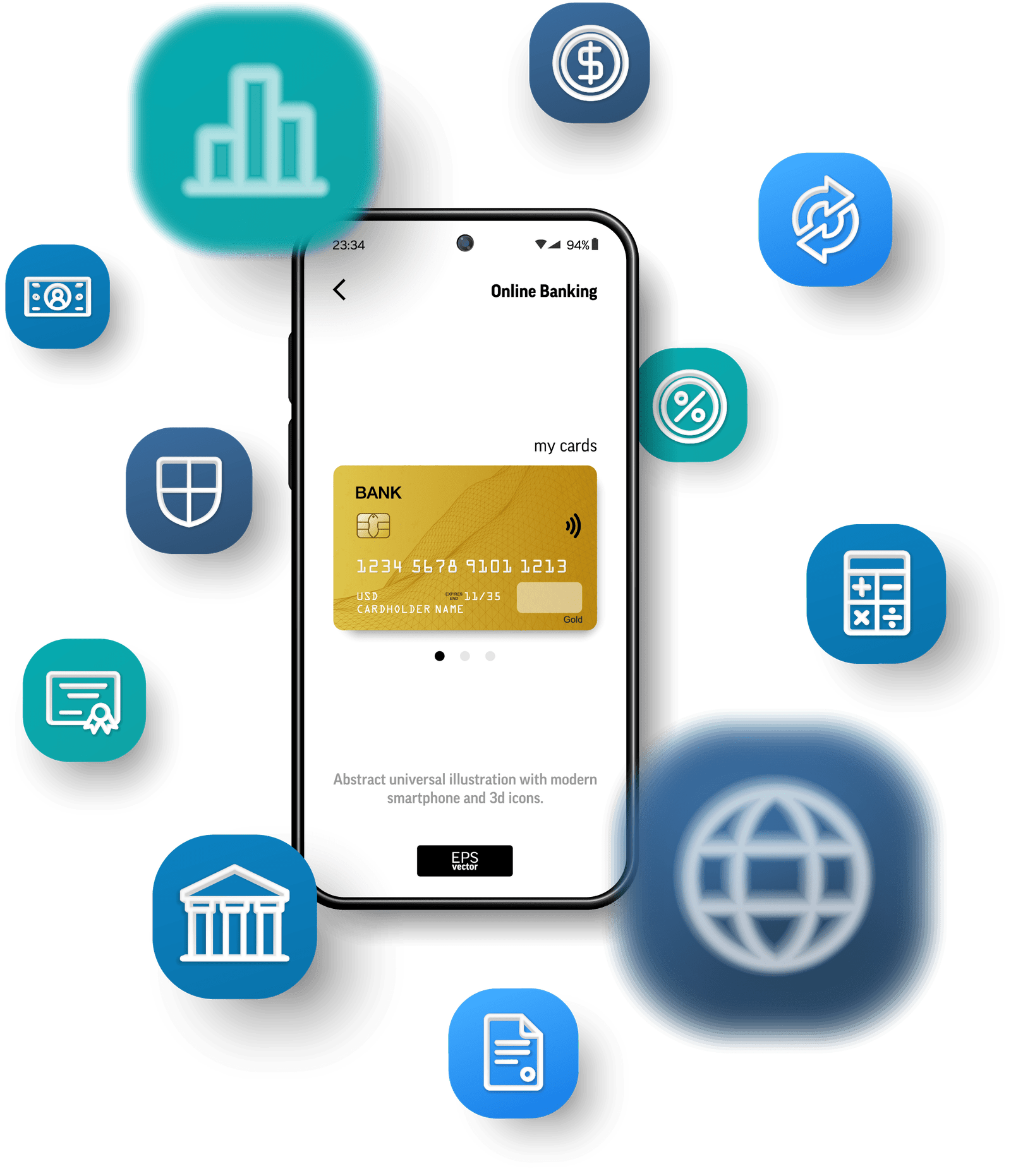Home » The Role of DeFi in Financial Inclusion: Empowering the Unbanked

Access to financial services is a crucial catalyst for promoting economic growth, reducing poverty, and fostering social development. However, despite the transformative potential of DeFi, many global populations still lack access to traditional banking services and financial resources.
This unbanked population faces numerous challenges in managing their finances, saving money, accessing credit, and participating in formal economic systems. They are often individuals from marginalized communities, low-income households, rural areas, or regions with limited financial infrastructure. Geographic barriers, high costs, lack of documentation, and financial illiteracy exclude the unbanked.
Fintech app developers play a key role in advancing DeFi solutions, leveraging blockchain for open and accessible finance. By eliminating intermediaries and reducing costs, DeFi empowers the unbanked with control over their economic lives.
Get free Consultation and let us know your project idea to turn into an amazing digital product.
Decentralized Finance (DeFi) is a groundbreaking financial system that operates entirely on blockchain technology, eliminating the need for traditional intermediaries like banks or financial institutions. Its ultimate goal is to create an open and inclusive financial ecosystem that gives individuals complete control over their assets and economic activities.
Moreover, DeFi utilizes self-executing smart contracts to automate and enforce financial transactions, enabling users to engage in various economic activities such as lending, borrowing, trading, and investing directly with one another. It encompasses decentralized exchanges (DEXs), loans and borrowing platforms, and stablecoins, which provide stability and serve as a means of business within the DeFi ecosystem.
Furthermore, DeFi leverages the power of blockchain technology to promote financial inclusivity, reduce costs associated with intermediaries, and allow for greater transparency through recorded transactions and smart contracts on the blockchain. However, despite the challenges of DeFi’s adoption, such as security risks, regulatory frameworks and compliance considerations, scalability, and user experience improvements, addressing these issues will make DeFi more accessible and user-friendly for everyone.
The global unbanked population refers to individuals who do not have access to traditional banking services or are excluded from the formal financial system. Understanding the challenges and opportunities surrounding this population is essential for addressing the issue of financial exclusion.
Geographical barriers, especially in rural and remote areas, limit physical access to financial institutions and infrastructure.
High fees and account maintenance costs associated with traditional banking services pose financial barriers for individuals with limited income.
Many unbanked individuals lack the necessary identification documents required by financial institutions, making it difficult for them to open accounts.
Limited knowledge and understanding of financial products and services hinder the unbanked population from effectively managing their finances and accessing appropriate resources.
Some individuals may be skeptical of or lack trust in formal financial institutions, leading to a preference for informal financial methods or cash-based transactions.

The proliferation of mobile phones and digital technology presents an opportunity to provide banking services through mobile banking platforms, reaching unbanked individuals in remote areas.
Decentralized financial technologies like blockchain and cryptocurrencies can enable secure and low-cost financial transactions, offering alternatives for the unbanked population.
Collaborations between traditional financial institutions, telecommunications companies, and other stakeholders can help extend banking services through agent networks, making them more accessible.
Providing financial literacy programs and resources can empower the unbanked population with the knowledge and skills necessary to engage with financial services effectively.
Governments can play a crucial role by implementing supportive policies and regulations that encourage financial inclusion, including simplified identification processes and reduced barriers to entry for financial service providers.
Addressing the challenges faced by the unbanked population requires a multi-faceted approach that leverages technology, partnerships, education, and regulatory measures. Embracing opportunities in DeFi can promote financial inclusion, empowering the unbanked. They can participate in the formal economy and improve their livelihoods.
Decentralized finance defi is a game-changer in the financial industry, providing accessible and inclusive financial services to underserved populations. Additionally, through blockchain technologies, DeFi provides borderless and permissionless access to financial services, regardless of one’s geographical location or socioeconomic background. DeFi eliminates intermediaries, reducing costs and barriers to entry and making financial services more affordable and accessible to everyone.
DeFi enables direct lending and borrowing, bypassing credit checks. It offers opportunities for individuals without credit history to access funds and earn interest. DEXs facilitate peer-to-peer trading globally. Stablecoins provide price stability and act as reliable mediums of exchange in DeFi.
DeFi promotes individual financial empowerment by giving users direct control over their assets. Individuals can manage their funds, make investment decisions, and participate in governance processes within DeFi protocols. This ownership and control over financial activities foster a sense of empowerment and inclusivity.
Challenges persist in realizing DeFi’s full potential for inclusion, like regulatory frameworks, user experience, security, and financial literacy. Nonetheless, the benefits of DeFi are undeniable. With DeFi, financial services are becoming more accessible, affordable, and inclusive, empowering individuals to take control of their financial lives.
DeFi offers financial services to individuals who are unbanked or underbanked, providing them with access to banking, lending, investing, and other financial activities. This inclusion empowers the unbanked population by enabling them to participate in the formal economy and build financial stability.
DeFi operates on blockchain technology, making it accessible to anyone with an internet connection and a compatible device. DeFi’s accessibility overcomes geographical barriers, connecting underserved populations to financial services.
DeFi eliminates intermediaries, reducing costs associated with financial services. DeFi reduces transaction fees and bureaucratic procedures, making financial activities affordable for the unbanked. This enables them to save and invest with minimal barriers.
DeFi enables peer-to-peer lending and borrowing, allowing individuals to directly engage in financial transactions without relying on traditional financial institutions. This decentralized approach promotes financial inclusion by providing opportunities for the unbanked to access loans, earn interest, and build creditworthiness.
With DeFi, individuals have direct control over their assets and financial activities. They can hold and manage their funds without the need for intermediaries, promoting financial autonomy and ownership.
The unbanked population often faces challenges related to digital literacy, limited access to technology, and internet connectivity. These barriers hinder their ability to fully participate in DeFi platforms and take advantage of the benefits they offer.
DeFi relies on blockchain development, which can be complex for individuals unfamiliar with the underlying technology. The learning curve associated with using DeFi platforms may present challenges for the unbanked population, requiring educational resources and support.
The regulatory landscape surrounding DeFi is still evolving, and compliance requirements can vary across jurisdictions. Uncertainty and lack of regulatory clarity may pose challenges for the unbanked population and hinder wider adoption of DeFi solutions.
DeFi platforms are not immune to security vulnerabilities, including smart contract exploits and hacking attempts. Furthermore, the unbanked face a higher risk of scams and fraud in DeFi due to limited knowledge and resources to protect their assets.
DeFi platforms often deal with cryptocurrencies, which can be highly volatile and subject to market risks. Price fluctuations and uncertainties may impact the financial stability and risk appetite of the unbanked population.
However, while DeFi offers significant advantages in empowering the unbanked, addressing the limitations requires comprehensive efforts. Collaboration, education, infrastructure, and balanced regulations maximize DeFi’s potential for empowering the unbanked.
Decentralized Finance (DeFi) is a game-changing solution to boost financial inclusion and empower underserved communities. Moreover, it offers a range of benefits that can have a significant impact, such as:
DeFi platforms provide essential banking services, like savings accounts and payment systems, without requiring a traditional bank account. Additionally, this enables unbanked individuals to securely store and transact funds, regardless of physical proximity or identification documents.
DeFi allows for peer-to-peer lending and microfinance opportunities, enabling individuals to lend or borrow funds without intermediaries. This allows the unbanked to access small loans for entrepreneurial activities, agricultural projects, or personal financial needs.
DeFi can enable faster and more cost-effective cross-border transactions, including remittances. Blockchain enables global fund transfers, reducing reliance on costly remittance services and improving financial access across borders.
DeFi offers various savings and investment options, including decentralized savings accounts, yield farming, and tokenized assets. DeFi enables the unbanked to save, generate passive income, and access investment opportunities. Furthermore, they benefit from higher interest rates and previously inaccessible wealth growth prospects.
DeFi-based insurance protocols offer affordable and customizable coverage options for individuals in underserved areas. DeFi insurance pools resources and innovative contracts to mitigate risks in agriculture, health, and daily life for the unbanked.
DeFi can provide financial education and improve financial literacy among the unbanked population. Educational initiatives and platforms empower individuals to navigate DeFi, make informed financial decisions, and utilize services effectively.
DeFi’s potential in addressing financial inclusion is evident through examples. Furthermore, it offers previously unavailable financial services to the underserved. Leveraging blockchain, smart contracts, and decentralized protocols, DeFi enables global economic participation, financial stability, and improved livelihoods.DeFi is a revolutionary solution that can bring about positive change and transform the lives of millions worldwide.
Moreover, the rise of decentralized financing (DeFi) is undoubtedly a game-changer for promoting financial inclusion.Yet, addressing regulatory and policy considerations is crucial to ensure a secure and inclusive environment. First, regulators must establish clear guidelines and frameworks to ensure DeFi platforms operate within legal boundaries. This includes addressing know-your-customer (KYC) and anti-money laundering (AML) regulations, investor protection, and consumer rights. By implementing security standards and best practices, regulators can safeguard users’ funds and personal information effectively. Additionally, policymakers must prioritize privacy laws and data protection regulations while maintaining user trust. Furthermore, regulators should monitor and evaluate potential systemic risks and their implications to ensure financial stability.
On the other hand, policymakers should prioritize investor education and awareness programs. Moreover, these initiatives will help individuals make informed decisions and navigate the complex landscape of DeFi.Regulatory sandboxes can provide a controlled environment to test new DeFi solutions and business models. Lastly, international collaboration is crucial to ensure regulatory consistency and address cross-border challenges. Furthermore, by working together, countries can establish common standards and frameworks that foster innovation and protect users in the global DeFi ecosystem.
Moreover, DeFi has transformative potential for financial inclusion, but addressing technological and infrastructural challenges is crucial for widespread adoption. Here are the key barriers we face and the potential solutions:

Reliable internet access is paramount for individuals to engage with DeFi platforms. However, despite the transformative potential of DeFi, many underserved regions lack adequate internet infrastructure. To ensure equal access to DeFi services, we must expand internet connectivity and improve network reliability.
The unbanked population may have limited familiarity with digital technologies and blockchain concepts. Promoting digital literacy programs and user-friendly interfaces can help individuals overcome these barriers and gain confidence in using DeFi platforms.

DeFi operates on various blockchain networks, each with its protocols and standards. Interoperability between blockchains enhances DeFi accessibility and usability. Users can seamlessly interact with multiple networks and applications.
Additionally, existing blockchain networks face scalability challenges, leading to congestion and high transaction fees during periods of high demand.The efficiency and usability of DeFi platforms improve with scalable solutions like layer-two protocols or sharding.
Best defi platforms require robust security measures to protect users’ funds and personal information. Trust and security in DeFi improve with regular smart contract audits, adopting security best practices, and establishing decentralized insurance mechanisms.
Furthermore, Decentralized Finance (DeFi) has immense potential to benefit the unbanked, but it is crucial to address the associated risks. These risks include intelligent contract vulnerabilities, market volatility, and potential scams. Minimize risks in DeFi with robust security measures: smart contract audits, user education, and decentralized insurance. Additionally, regulatory oversight and compliance frameworks can also significantly protect users and ensure responsible behavior within the DeFi space. Improve financial literacy, user-friendly interfaces empower unbanked. Navigate DeFi effectively, mitigate risks.
Decentralized Finance (DeFi) can revolutionize financial inclusion and redefine the global economic landscape. As DeFi technology matures and overcomes existing obstacles, its potential to empower the unbanked population becomes increasingly evident. Here are some key aspects that unequivocally demonstrate the bright future of DeFi in financial inclusion:
DeFi offers equal opportunities to participate in finance. It bridges the gap for the unbanked. With improved infrastructure and literacy, more people access essential financial services globally.
DeFi empowers individuals, removing gatekeepers. Peer-to-peer lending, decentralized exchanges, and smart contracts offer access to loans, passive income, and investments. This democratization fosters economic empowerment, reducing reliance on intermediaries.
DeFi drives innovation, offering diverse financial products. Moreover, entrepreneurs develop tailored solutions for the unbanked, such as microfinance, digital identity, and decentralized savings, expanding their choices.
DDeFi’s borderless nature streamlines cross-border transactions and reduces remittance costs. By leveraging blockchain technology, individuals can send and receive funds globally with unparalleled speed, security, and lower fees. This can tremendously impact the lives of migrant workers and their families, enabling faster and more affordable remittance transfers.
DeFi’s recognition prompts collaboration between traditional finance and DeFi. Partnerships merge security, compliance, and innovation, benefiting the unbanked.
However, notwithstanding the potential benefits, regulatory frameworks, security vulnerabilities, and technological barriers remain significant challenges. Collaboration among governments, regulators, industry players, and technology developers is vital to tackle challenges. Clear regulations, enhanced security measures, and digital literacy initiatives must be promoted collectively.
Decentralized Finance (DeFi) can revolutionize financial inclusion and redefine the global economic landscape. Fintech software development plays a crucial role in maturing DeFi technology and overcoming existing obstacles, making its potential to empower the unbanked population increasingly evident. Here are some key aspects that unequivocally demonstrate the bright future of DeFi in financial inclusion.
Senior Content writer

Founder and CEO

Chief Sales Officer
